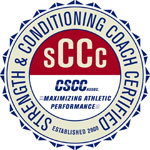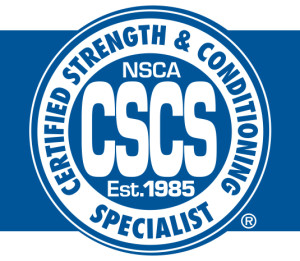So you want to become a strength and conditioning coach?

Congratulations on starting your journey to become a strength and conditioning coach. To become a strength and conditioning coach is to be entrusted with the physical development of athletes so that their performance is enhanced. With so many people engaged in sports for recreation, as well as serious competition, the market has never been better for strength and conditioning professionals to provide their services. As college athletics has shown, strength and conditioning coaches are highly trained professionals, and their value to athletic programs is increasing (see our list of the highest paid strength and conditioning coaches).
Technically, anyone can become a strength and conditioning coach by just telling people that they are one. There are very few regulations in the United States as to who is allowed to train clients / athletes in strength training and conditioning. This lack of regulatory oversight has spawned a plethora of self-proclaimed strength and conditioning coaches who may or may not know how to train an athlete safely and efficiently. A properly trained strength and conditioning coach should have knowledge of the scientific and applied aspects of physical activity.
Think you know as much as your average certified strength and conditioning professional? Try a few practice questions here.
As in many fields that seek to legitimize and standardize their profession, the strength and conditioning industry saw the need for greater regulation and the credentialing of strength and conditioning professionals. Since the general public might not possess a great deal of knowledge of strength training and conditioning, it would be difficult for the average person to discern a knowledgeable strength coach from an inexperienced one. Professional organizations like the National Strength and Conditioning Association (NSCA) and the Collegiate Strength and Conditioning Coaches Association (CSCCa) developed knowledge and experience standards for professional credentialing to help the public in making more educated choices when selecting a strength and conditioning coach.
How to Become a NSCA Certified Strength and Conditioning Specialist (CSCS):
Step 1: Obtain a bachelor’s degree (or be a college senior)
To be able to take the Certified Strength and Conditioning Specialist (CSCS) Exam in the United States, the National Strength and Conditioning Association (NSCA) requires that you either possess a bachelor’s degree, or be currently enrolled as a college senior, at an institution accredited by one of the six regional accrediting institutions. The degree can be in any field of study. Qualified degrees also include a terminal degree in physical therapy or a terminal degree in chiropractic medicine. If you reside in the United States, the NSCA will require you to submit an official transcript of your degree(s). CSCS candidates outside the United States must submit a photocopy of their transcript, diploma, or certificate to prove that they have attained at least a bachelor’s degree.
Step 2: Pass the NSCA CSCS Exam
You can register for the CSCS Exam online through the National Strength and Conditioning Association website. Exams are offered year-round at Pearson VUE testing centers in the United States. The exam is four hours long and divided into two sections: Scientific Foundations and Practical / Applied. Exam questions are presented in multiple-choice format.
Step 3: Get CPR & AED certified
At some point in time, you need to get Cardiopulmonary Resuscitation (CPR) and Automatic Electronic Defibrillator (AED) certified from an agency that teaches the certification class with a hands-on component and a skills performance evaluation. The American Heart Association and Red Cross offer acceptable CPR / AED classes. If you’re still in college, see if your school offers a free CPR / AED course so you can save a few dollars. Check with your institution’s Recreation Center, Student Health Center, or Student Affairs / Activities office to see if a free class is available. You may also be able to take a class for credit, but taking a course for credit at higher education tuition rates will likely end up being much more expensive than your standard American Heart Association or Red Cross classes. You can still register for, and take, the Certified Strength and Conditioning Specialist exam without a current CPR / AED certificate. However, you must have a current CPR / AED certificate within one year of taking the CSCS exam.
Step 4: Send in your supporting documentation
After taking the Certified Strength and Conditioning Specialist exam, you’ll need to send the NSCA your college transcripts (stating that you’ve graduated with a bachelor’s degree) and a copy of your CPR / AED certification. Once the NSCA can verify that you meet their minimum prerequisites, your exam scores will be released. Supporting documents must be sent to:
National Strength & Conditioning Association
1885 Bob Johnson Drive
Colorado Springs, CO. 80906
Fax: 719-632-6367 (for copies of CPR / AED certificates only)
Email: exams@nsca.com

How to Become a CSCCa Strength and Conditioning Coach Certified (SCCC)
Step 1: Get CPR / AED / First-Aid certified
Prior to working in a strength and conditioning gym you need to get Cardiopulmonary Resuscitation (CPR), Automatic Electronic Defibrillator (AED), and first-aid certified from an agency that teaches the certification class with a hands-on component (online only classes are not accepted). The American Heart Association and Red Cross offer acceptable CPR / AED / First-Aid classes. If you’re still in college, see if your school offers a free CPR / AED course so you can save a few dollars. Check with your institution’s Recreation Center, Student Health Center, or Student Affairs / Activities office to see if a free class is available. You may also be able to take a class for credit, but taking a course for credit at higher education tuition rates will likely end up being much more expensive than your standard American Heart Association or Red Cross classes. If you already have your CPR / AED certification, it must be current on the final day of the testing window for the SCCC.
Step 2: Be (or want to be) a full-time strength and conditioning coach at the collegiate or professional level
The CSCCa wants applicants for the SCCC credential to be full-time, practicing strength and conditioning coaches at the collegiate or professional level. However, if you don’t actually work in the field yet, you can still obtain the certification if you’re a student that wants to work in strength and conditioning full-time at the college or professional level.
Step 3: Become a member of the Collegiate Strength and Conditioning Coaches Association (CSCCa)
Register and pay your annual membership dues ($50 per year for students / $100 per year for full-time members as of 12/15/15).
Step 4: Complete an approved 640-hour internship
Fill out the appropriate waivers, pay the $225 internship fee, and complete a 640-hour strength and conditioning internship under the supervision of a CSCCa-approved mentor (approved mentor list).
Step 5: Submit a strength and conditioning program to the CSCCa for review
A program template and instructions will be mailed out to SCCC candidates for them to create a training program.
Step 6: Obtain a bachelor’s degree from an accredited institution
Once a bachelor’s degree is obtained in any field of study, have your school send transcripts to the CSCCa.
Step 6: Pay your certification fee ($360 for CSCCa members and $470 for non-members)
The certification exam fee must be paid by February 16, 2022 for the Spring 2022 examination.
The Collegiate Strength and Conditioning Coaches Association only offers their SCCC exam once a year at their annual conference: 2016 in Fort Worth, Texas; 2017 in Orlando, Florida; 2018 in Fort Worth, Texas.
Here are the statistics for the SCCC exam from 2012 – 2015:


6 thoughts on “How to Become a Strength and Conditioning Coach”